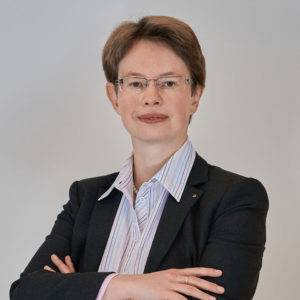Research Interests
Corinna’s research interests focus on topics in the area of Secure Communication Systems (SeCoSys) with investigations on different issues related to air/ground communications and can be summarized into the two pillars: (1) Communication Networks including network infrastructure, communication standards & strategies and hardware/software design issues; (2) Data Management looking on issues about acquisition, storage, pre-processing/validation/analysis and access & sharing. Horizontal services over these pillars covering different applications (e.g., smart building, automotive, logistics, monitoring, aeronautics), management issues, security on different layers, resilience/availability/standardization and socio-economic aspects.
She combines theory and practice in a convincing manner, which is shown in a high number of students (BA, MA, Ph.D.) supervised and in over 60 publications. She contributed to several EU projects and national projects (e.g., NEWSROOM, AMIUS, CONCORDIA, and SmartenIT) and different standardization organizations (IETF, ITU, ASUT) until now and continues with these activities. Due to her expertise, she is often invited as expert in panels and to the European Commission as reviewer.
Bio
Corinna is Head of the SeCoSys-Team at the Research Institute CODE, Universität der Bundeswehr München (UniBw M). Further she is active partner in the Nation Cyber Coordination Center for Germany (NCC-DE).
She received her Venia Legendi in the area of Informatics for livetime from the University of Zurich (Switzerland) 2021 after her employment at the Communication Systems Group (CSG) as Head of Mobile and Trusted Communications. It was in 2021 also accepted by the UniBw M. From the Technische Universität München (Germany) she received her Dr. rer. nat. (PhD) in 2013 building on topics of her diploma study in Bioinformatics from the Eberhard-Karls Universität Tübingen (Germany).
For more details about her expertise, teaching, and publications check out her homepage, which is continuously updated by latest news, publications, research results, and job offers.
